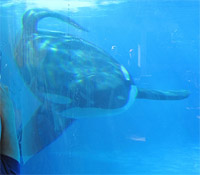SeaWorld’s ‘Baby Boom’
Two female orcas at SeaWorld Orlando are pregnant—one is expected to give birth later this month or in early June—but we’re not celebrating.
If the calves survive, what do they have to look forward to? Swimming endless circles in barren concrete tanks, doing circus-type tricks, and dying an early death. Twenty-one orcas died in U.S. SeaWorld facilities between 1986 and 2008—an average of nearly one each year for 22 years. Their deaths were caused by severe trauma, intestinal gangrene, acute hemorrhagic pneumonia, pulmonary abscesses, chronic kidney disease, chronic cardiovascular failure, septicemia, and influenza. In some cases, the cause of death could not even be determined, but it is clear that none of these animals died of old age.
The father in both of the pregnancies is Tilikum, the same orca who attacked trainer Dawn Brancheau—ripping off her left arm and part of her scalp, crushing her ribs, and breaking bones throughout her body before drowning her. Despite knowing about the extreme danger posed by Tilikum—including the fact that he had killed humans twice before—SeaWorld refuses to “Free Tilly” most likely because he’s a valuable and prodigious breeder. Tilikum has already sired 13 calves for SeaWorld.
Enough is enough. Please take a moment to write to the Blackstone Group—the company that owns SeaWorld—and ask that it send Tilly and the other animal inmates in its facilities to sanctuaries.
Written by Paula Moore


